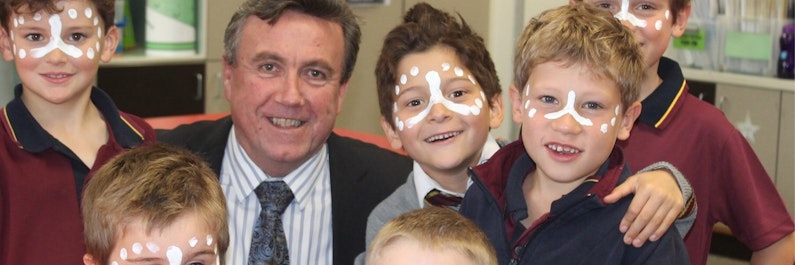National Sorry Day - Our Commitment as a College
National Sorry Day is an annual event that has been held in Australia on 26 May, since 1998. On the same day in 1997 the report entitled 'Bringing them Home' - the National Inquiry into the Separation of Aboriginal and Torres Strait Islander children from their families, was tabled in Federal parliament. Sorry Day commemorates the tabling of this report, and is an annual day to commemorate and remember all of those Indigenous people who have been impacted by government policies or forcible removal that resulted in the stolen generations.
Recently I visited Nyangatjatjara College, a remote Indigenous community school in Yulara Northern Territory. My visit to this college, coupled with some further service work I did while on route through Alice Springs, reminded me of why it is so important for Scotch to remain committed to the education and graduation of Indigenous students from across the state and country.

Our Indigenous programme, which now includes some 38 students, was drawn into further focus this year at the sad passing of Mary Macha, a friend to Scotch College, who died at the age of 94. Mary made a contribution to our focus on Indigenous culture well before there was any Sorry Day, and well before we set up our current formalized student programme.
Scotch had the privilege to know and benefit from an association with Mary Macha. A pioneer in the collection, understanding and protection of Aboriginal art and artifacts, Mary visited and researched Aboriginal art, ran a gallery in Perth, had a wide collection of her own, and advised museums and collectors. Even in the last year of her life she completed a book on Aboriginal illustrations. She respected and encouraged an understanding of Aboriginal culture and story and researched the background of all works of art she collected. Scotch benefited greatly from her knowledge and her gifts. Mary's first contact with Scotch was through her brother Tom Hill (OSC '37) who attended Scotch. Sadly, Tom died at Kokoda in World War II.
The first gift from Mary Macha was a large Papunya painting depicting the Year of the Child. This large and important work hung for many years in the front hall and would have been seen by many hundreds of boys. Perhaps the first time they had seen Aboriginal art.
In the 1980's Mary Macha and Julie Dickinson (wife of our 5th Headmaster William Dickinson), created an Artist in Residence scheme within the school. Groups of artists would be invited to Perth when their works, and work of their area, were being displayed at the Perth Aboriginal Art Gallery, which had been established by this visionary woman. Needing accommodation, room was made for these visitors in the College's boarding houses and, in return, the visiting artists demonstrated their art skills. Artists visited from Kalumburu, Central Desert, One Arm Point and Oenpelli.
Recently Mary Macha donated a very valuable and beautiful collection of artifacts to the school, examples of hunting and gathering tools, which are on show in the front office. The collection the school holds is unique, and we are deeply honoured to own such wonderful examples of Aboriginal culture for all students to access. We are very grateful that Mary Macha should have chosen to expand our Indigenous collection and enrich our commitment to reconciliation through her passion, generosity and of course her legacy in the form of art.
This early commitment by Mary Macha to recognizing the importance and value of our indigenous people, continues to act as a driver for us to grow and expand our commitment to reconciliation through education.
On Friday 26 May, our College will acknowledge Sorry Day and our boys will represent the College at an appropriate celebration. As a modern and progressive College, with over 38 enrolled Indigenous students, it is our role to ensure that we take this day, and other times such as NAIDOC week, to celebrate the strength and resilience of the Aboriginal and Torres Strait Islander people, and to reaffirm Scotch's role in committing to healing and reconciliation.
